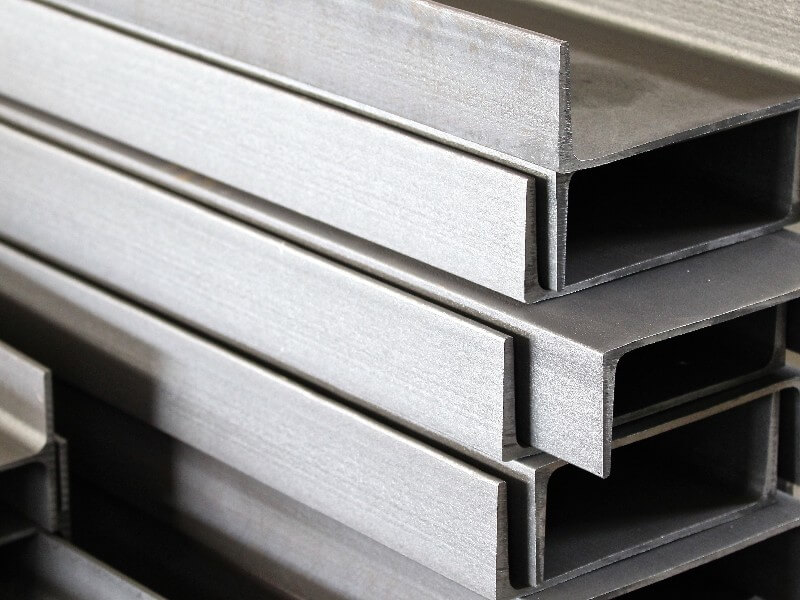
430 stainless steel is a widely used alloy in industry for its balance of cost, strength, and versatility. Being a ferritic material with no nickel in its composition, it offers good performance in indoor environments and applications with low chemical aggression.
In this article, you'll discover the main characteristics of 430 stainless steel, understand its advantages over other alloys, such as 304 stainless steel, and learn about its applications in a wide range of sectors—as well as the unique features offered by Grupo Aço Cearense. Enjoy!
THE stainless steel 430 is a metal alloy widely used in industry due to its excellent cost-benefit and corrosion resistance in less aggressive environments.
It is a ferritic stainless steel, that is, composed mainly of iron (base element of the alloy) and chromium (between 16% and 20% which increase resistance to oxidation and corrosion), without the significant presence of nickel.
This composition gives 430 stainless steel some essential characteristics:
Because it is ferritic, 430 stainless steel is not recommended for environments with high salinity or constant exposure to humidity — in these cases, other, more resistant alloys are recommended.
430 stainless steel is recognized for its combination of strength, aesthetics, and affordability. These advantages make it the ideal choice for a variety of industrial and residential applications. Below, we explore the main benefits of this alloy in more detail.
One of the great advantages of 430 stainless steel is its competitive price. Because it contains no nickel, this alloy is significantly cheaper than other grades, such as 304 stainless steel.
This allows for large-scale production of cost-effective metal equipment and structures without sacrificing reliable performance in moderately corrosive environments.
This savings makes 430 stainless steel ideal for companies seeking budget efficiency, especially in high-volume projects such as manufacturing appliances or decorative components.
430 stainless steel boasts excellent formability, meaning it can be cut, bent, pressed, and molded with ease. This is essential in the metalworking industry, as it streamlines manufacturing processes and allows for greater freedom in part design.
Furthermore, although its weldability is not as superior as that of 304 stainless steel, 430 stainless steel can be successfully welded using appropriate techniques, especially in thin thicknesses, such as those used in appliances and interior finishes.
With a bright, uniform finish, especially in the BA (Bright Annealed) version, 430 stainless steel offers sophisticated visual appeal. This eliminates the need for painting or additional treatment, saving time and resources in finishing products.
This aspect is valued in applications where aesthetics are important, such as in the manufacture of modern household appliances, decorative pieces and urban furniture.
430 stainless steel is 100% recyclable, which directly contributes to environmental sustainability. At the end of its useful life cycle, it can be reused in new products without losing quality.
This characteristic is particularly relevant for companies that adopt ESG (Environmental, Social and Governance) policies and are concerned about their ecological footprint.
Furthermore, the use of recyclable materials is in line with the requirements for environmental certifications and cleaner production processes.
In environments with constant temperature fluctuations, such as industrial kitchens or production lines, 430 stainless steel maintains dimensional stability. Its low coefficient of thermal expansion reduces the risk of structural deformation and ensures greater component durability.
This way, it is possible to guarantee the stable performance of parts exposed to heat, such as the internal parts of ovens and stoves.
430 stainless steel is the ideal choice for indoor environments where exposure to moisture and chemicals is controlled. In residential or commercial applications, this alloy offers the necessary performance at a reduced cost.
Furthermore, the material is widely used in tabletops, elevator finishes, appliance panels and residential sinks, as its resistance and modern look add value to the project without requiring high investments.
Versatile and functional, the stainless steel 430 has a wide range of applications, especially in industry and the home. It's ideal for projects that require high mechanical strength and a clean appearance, but are not exposed to severe corrosion.
Check out where 430 stainless steel is most used:
This wide applicability is a result of its good oxidation resistance, clean metallic aesthetics and ease of forming, making 430 stainless steel ideal for practical and elegant solutions.
A common difficulty when choosing between these types of alloy is understanding the differences between two similar models of stainless steel: 430 and 304. Although visually similar, they have different properties and compositions that directly impact the choice of application.
The main difference is the presence of nickel in 304 stainless steel, which provides greater resistance to corrosion and greater durability in aggressive environments.
Therefore, 430 stainless steel is ideal for indoor environments and locations where exposure to moisture or chemicals is limited. 304 should be chosen when chemical and corrosion resistance are a determining factor.
For those looking for 430 stainless steel with quality and reliability, Ceará Steel Group stands out as the leading reference in the market. Our company offers a complete portfolio with custom cuts and prompt delivery, in addition to adhering to strict quality standards.
See what sets Grupo Aço Cearense's products apart:
Furthermore, we have efficient logistics throughout Brazil, ensuring agility in supply and specialized technical support at every stage of the process.
As we have seen, steel stainless steel 430 is a practical and economical solution for those seeking performance, durability, and aesthetics in indoor applications. With several technical advantages and excellent value for money, the material stands out in the industrial and residential markets.
Check out the best parts on the iron and steel market browsing our catalog!